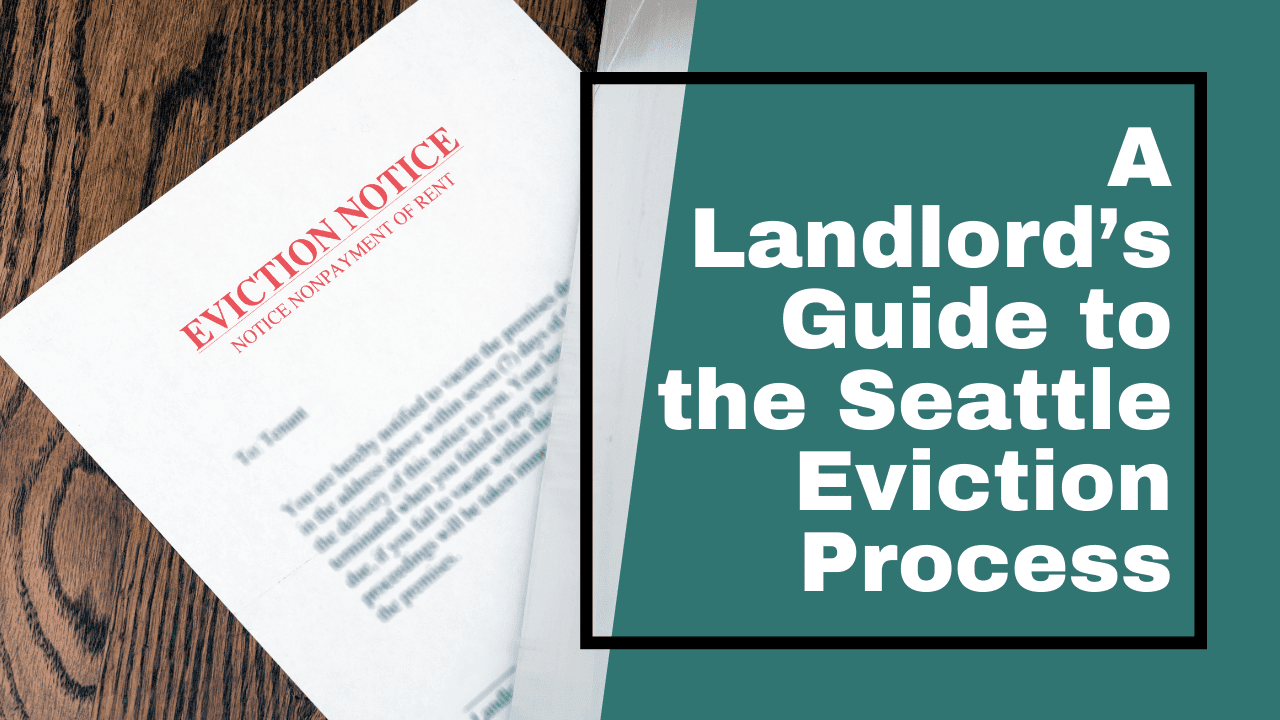
The Seattle eviction process is complex, costly, and wrought with difficulties for landlords, can easily require 2 or more months under normal circumstances, however, this process has been stalled even further, due to the COVID pandemic and multiple eviction bans that are in place by city municipal ordinances, state executive orders, and federal law. Working with an experienced Seattle Property Management firm and landlord/tenant attorney is highly advised. We are experts who only work with top Seattle law firms and are happy to assist landlords in regaining possession of their properties and placing new well-qualified tenants.
The first thing to understand is eviction is a last resort process and is a legal process for an owner to regain physical possession of their property from the tenant(s) who are not paying their rent or are otherwise violating their lease agreement. Although, in certain circumstances, you may also obtain a money judgment for unpaid rent. The eviction process does not guarantee you will be able to recover any money you may be owed. Collection of the unpaid rents may require yet another process after you have control of your property back.
Starting with the federal restrictions the CDC has put a halt to evictions when a tenant who isn’t paying rent has suffered financially due to the pandemic. Layer that with Governor Inslee’s moratorium that prohibits eviction, late fees, etc. currently set to expire March 31, 2021, but likely to be extended further. Then at the city level in March 2020, the city of Seattle passed a moratorium that has been extended multiple times, currently, the moratorium on evictions expires on March 31, 2021. This moratorium will likely be extended again at least into the Summer of 2021. In addition, the Seattle City Council passed a set of rules restricting evictions for six months after the mayor’s moratorium expires that currently puts the first available date to continue forward with eviction at September 31, 2021. Combining this with the increased volume of cases the courts will undoubtedly see once the moratoriums are lifted and the Seattle City Council’s wintertime eviction ban that prohibits evictions between Dec. 1 and March 1. It is quite possible Landlords could be waiting until March 2022 or later to regain possession of their properties from non-paying tenants. There are lawsuits from various landlords and property management advocates that are challenging some of these restrictions in court.
Generally, Seattle landlords have a more complex eviction process than landlords in other local communities such as Tacoma, Burien, Normandy Park, Des Moines, and Federal Way. Although several of these cities have their own unique requirements, contact us for more information on the specifics of these cities’ requirements. Although it seems to be an ongoing and ever-present catastrophe, the pandemic will not last forever, and neither will the eviction bans.
You’ll need to know how to evict a tenant in Seattle once you’re able to move through the courts again.
Seattle’s Just Cause Eviction Law
The just cause eviction laws in place in Seattle prevent landlords from arbitrarily terminating any lease before the expiration of the term and/or ending any month-to-month rental agreement. There are a very limited number of reasons acceptable to terminate a lease and/or evict a tenant. A few of the most common allowable just cause reasons include:
- Failure to pay rent after receiving a 14-day pay or vacate notice
- Failure to comply with at least three 10-day notice(s) to comply or vacate for lease violations other than non-payment of “rent.”
- The owner wishes to sell the property (you need to provide tenants a minimum of 90-days advance written notice)
- The owner wishes to move into the property or have an immediate family member move into the property for use as their principal residence (you need to provide tenants a minimum of 90-days advance written notice)
- The owner seeks to substantially rehabilitate, demolish, remove use restrictions, or change the use of the property (this may require you to complete a Tenant Relocation Assistance process first)
Make sure your lease agreement is clear about why you might end a rental contract or evict a resident.
Serve a Pay or Vacate Notice
Your first step is to serve a Pay or Vacate Notice, and we recommend you do this as soon as possible after the state-mandated grace period expires after you do not receive the rent. The reason is simple; your notice period is 14 days. You cannot do anything for 14 days after serving this notice except for wait. Serving the notice is vital to protect your rights even if you have no intention of evicting the tenant or if your tenant has promised to pay the past due rent before the 14-day waiting period ends. You want to get the process started just in case you need to evict a non paying tenant. Every day that you don’t receive the rent makes the whole process more expensive and complicated.
Preparing the Legal Documents & Filing for an Eviction
Usually, if a tenant wants to stay in the property, they will catch up with the rent within the notice period and set your mind at ease. However, if those 14 days come and go and you still have not received the overdue rent and your tenants are still not cooperating or communicating, you’ll need to file for an eviction. You will need to do this through the King County Superior Court, and the Summons and Complaint. This is where it is important to be working with an expert Seattle Property Manager, like ACRES Property Management, and have an expert landlord/tenant attorney who will make sure all the notices are properly prepared, posted, and served on the tenants. The Summons and Complaint must be well-drafted to avoid unnecessary delays during the legal process because your tenants have access to free legal counsel to help defend against an eviction. Serving the Summons and Complaint (eviction paperwork) is you beginning a lawsuit against your tenants to recover possession of your property and those documents will have to be legally “served” on your tenants this is best done by a legal process server, not yourself.
After the eviction is filed and served, your attorney will schedule a court hearing where typically you’ll either receive a default eviction judgment because the tenant does not respond, or you and your attorney will be required to argue against the tenants’ defenses. Although the latter can be more costly and time-consuming when working with experts who can document and prove your case including that rent is overdue, the tenant(s) have not paid, you have complied with all the federal, city, and state laws and requirements. You will ultimately get your property back, either through a formal eviction (Writ of Restitution) or by negotiating a move-out date with your tenants.
Obtaining a Writ of Restitution
 Once the courts rule in your favor and provide you with the legal right to remove the tenant from your property, you will receive a Writ of Restitution. In a worst-case scenario, your tenants will still refuse to leave and they’ll need to be physically removed. This is not something you should or have the right to do yourself; it is a job for the sheriff. This is where you or we will need to wait outside of your Property until the sheriff physically removes the tenant from the home before you can go in to change the locks and remove the tenant(s) possessions. It is quite rare an eviction ever makes it to this stage, but if it does, you will be glad there is a law enforcement professional present to assist you in regaining possession of your property. You want to make sure you have a handyman and/or locksmith present and will also typically be required to either store the tenants’ possessions and/or have a moving crew available to move the tenant(s) possession to the curb.
Once the courts rule in your favor and provide you with the legal right to remove the tenant from your property, you will receive a Writ of Restitution. In a worst-case scenario, your tenants will still refuse to leave and they’ll need to be physically removed. This is not something you should or have the right to do yourself; it is a job for the sheriff. This is where you or we will need to wait outside of your Property until the sheriff physically removes the tenant from the home before you can go in to change the locks and remove the tenant(s) possessions. It is quite rare an eviction ever makes it to this stage, but if it does, you will be glad there is a law enforcement professional present to assist you in regaining possession of your property. You want to make sure you have a handyman and/or locksmith present and will also typically be required to either store the tenants’ possessions and/or have a moving crew available to move the tenant(s) possession to the curb.
Once you have regained possession of your property you can begin the process of preparing the property (significant cleaning and/or repairs may be needed after an eviction) for a new well-screened and qualified tenant. We are here to help with all these post-eviction tasks as well.
Evictions are a worst-case scenario and are never pleasant for anyone involved. We work tirelessly with both tenant(s) and owners to look for alternatives. Sometimes, however, you’re left with no choice. If you need support during the eviction process or dealing with non-paying and/or difficult tenants, please do not hesitate to contact us. We have been through it before, know the processes inside and out, and will do everything possible to regain possession of your property as quickly as possible while respecting all the parties and individuals involved.
 Josh Auxier
Josh Auxier